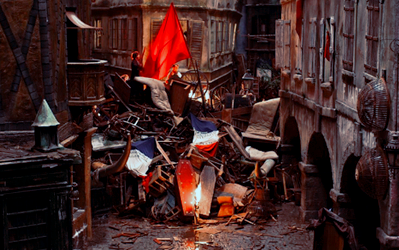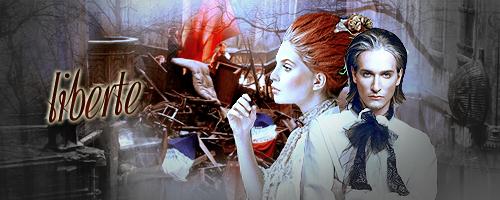Post by FABIEN BAHOREL on May 23, 2013 20:32:30 GMT -5
[atrb=border,0,true][atrb=style, background-color: f9f9f9; border: #1f4579 solid 10px; width: 420px; padding: 15 5 15 5px;] At the end of the day you're another day colder FULL NAME: Fabien Placide Bahorel NICKNAMES: Bahorel, Monsieur Plaisir HERITAGE: French AGE: 28 GROUP: ABC Member CANON: Yes PLAYBY: Iwan Lewis ----- PERSONALITY: Bahorel is an idler, someone who values fun over everything, and who can spend his time endlessly strolling through Paris, thinking on nothing in particular, just enjoying to be out and about – and on the way to the next tavern. He spends money at will and whim, especially on expensive vintages and women, his two most prominent weaknesses. Hugo calls him a ‘wholesale blusterer […] loving nothing so much as a quarrel, unless it were an uprising; and nothing so much as an uprising, unless it were an revolution’, but he is by no means an idealist. He would literally set things in motion, using his charm and his way of words to rally people, just to see what would come of it, and be the first to use his hands in a brawl or the real fight of a revolution. He wishes to see change about, but a huge part of that is due to him hating stagnation and boredom above everything else. It is not that he doesn’t care for the rights of the poor, but it is not his priority. He will fight for his friends to the last moment, but never with a bitter determination, he will laugh death in the face should he meet him on the barricades. His wit is sharp and stings, and he can easily offend people, even though he usually doesn’t mean harm, just likes to provoke, before things get sappy and too harmonious. After all, what is an evening without a try tavern brawl which gets you the attention of the ladies? Being the loiterer he is, Bahorel has never known true ambition, hanging around in his studies for eleven years now without caring to get himself into any exams yet. Life’s too short to spend it brooding over books, after all, and he already knows that while he attends law-school once in a while, he never wants to be one. He will push the revolution onward fiercely, because he wants to see it done, and is not likely to get sidetracked now it is his prime concern. APPEARANCE: Bahorel is of average height with his 6’1 and has light brown hair of maybe seven inches length, with some bangs falling into his eyes (and he loves to toss them back with that certain flick of the head), often worn in a side parting over his left eye. His eyes are of a dark, piercing blue and they usually sparkle with excitement and mischief, revealing his happy-go-lucky nature. This, along with his devil-may-care smile and his overall nicely carved features make him a right dandy and ladies’ man, and he knows it. He doesn’t dress too expensively, but he cares for always looking neat and tidy, often daring colorful experiments like a light green vest and a middleblue cravat. Usually, he is clean shaven, but sometimes he leaves a bit of stubble, claiming it lets him look more daring. GOALS: His goal is to have as much fun in life as possible, and to go out with a bang, if he has, in fact to go at all. He wants the revolution to be succesful, as it will be exciting to live in such times again, when a new world dawns. And of course, he wants to see his friends’ dreams come true, equality and all that HISTORY: Fabien Placide Bahorel was born to a peasant family in a hamlet a good fifty miles north of Paris, as the second son and last child. From his earliest childhood on, he was soon said to be a dreamer, a shirker even, he just did not like the hard field work and rather spent his time wandering around, telling boasting stories about some adventures he had had to the local girls. He was a cheeky rascal, someone who never stepped down from an argument, and didn’t even back down before older boys, which led to frequent brawls once his counterparts ran out of things to say. His father tried innumerous times to knock some sense into his second son, making him as dutiful as the elder one, Jean, but to no avail. The occasional visits he got from his brother, a man who had gone to Paris, turning his back on peasant life and somehow had managed to make a fortune with weapon manufactury, didn’t exactly help. They only incited Bahorel’s dreams of a life away from ploughing fields and herding sheep, a life of leisure and luxury with time fully at his command to spend at whim, without anyone giving him a bad conscience for it. When Bahorel turned seventeen, his uncle had come for his annual visit again, and he unwittingly witnessed his nephew getting yet into another fight by working his mouth too much in front of the hamlet youth. After he came home battered but in high spirits and was greeted with the next lecture by his father, his uncle unexpectedly took sides with him, and claimed the boy was far too witty and smart to become yet another field worker, and should rather search his fortune elsewhere, maybe even pursue a career at law, the way he could argue his cases. After a long discussion, Bahorel’s parents finally agreed, and the young boy was sent to Paris under his uncle’s tutelage. Bahorel himself said that was when his life really began, the life of leisure and luxury he always had envisioned. After getting his taste of law school, he decided that being a lawyer was nothing he ever wanted to be, but the general life of a student appealed to him much. Aided by his bacherlor uncle’s generous allowance of roughly 3000 francs, he spent his life dawdling, discovering a fine taste in wine without turning a drunkard and an equally fine taste in women without actually changing them like his shirts. He called himself a connoisseur – and his only enemy was boredom. In the year 1822, shortly after he had come to Paris, he got involved into his first serious skirmish and there tasted the first, sweet mouthful of the thing called rebellion. A student of a liberal party had been shot at a demonstration, and at this Lallemand’s funeral, Bahorel instigated his friends to start a riot in Lallemand’s honour. They didn’t last long, unorganized as they were, but they managed to smash a few windows in and kept the police and guards at arms’ length with throwing cobblestones at them they had torn from the streets. For a few weeks, Bahorel and his friends were the heroes and the talk of whole student Paris, and he had never felt grander. How easy it was to make people follow you with a few well-placed words, how easily you could REALLY change something, if you only planned it well! For really pursueing this thought further, however, he lacked the ideals and the conviction. Bahorel only wanted to change the world so he could see what it would look like when he was done, it was all a big experiment to him, his motto being: ‘you don’t know until you tried’, which applied to many things in his life. If he felt like it, he would sit in lectures about philosophy, history, literature and even theology, just to broaden his horizon, but he would drop the subject as soon as it started to get old. His uncle didn’t seem to mind his nephew’s lifestyle much, he apparently had money enough to spend it on Bahorel’s whims. His attitude changed only lightly when he got in contact with a certain group flocking around a charismatic student called Aurelien Enjolras, an even fiercer orator than Bahorel himself, and with a conviction burning in his eyes that was fascinating. Some of his friends he knew already, having spent many an evening in similar taverns, and because he had nothing better to do, he attended his first meeting of the so called Friends of the ABC. Now, here was something new! It felt a little like his old days of the Lallemand riots coming back to Bahorel, and he had nothing against changing the status quo. He was ready to rant about the current state of France anyway, just as he liked to rant about everything, and change was always welcome. Why not give the tries of 1830 another try and finally get a republic? Bahorel quickly became friends with all of Les Amis, and he started to feel at home in a group, even though he never would share all their high ideals. He admired Enjolras, but he did not worship him, he laughed about Combeferre’s studiousness (how could one, really!) Marius’ shyness (goodness, that guy needed a helping hand!), was the worst critic of Jehan’s poems and liked to boast around with Courfeyrac. Things got more serious soon, and he tried to help all he could, but he was always ready to remind his friends that they should not forget what life really was for: living. Should his time come, should he die at the barricades, die for change and his friends’ ideals, he won’t be too pleased, but he will see it as yet another challenge. For what else is Death than a thitherto unknown adventure? ----- ALIAS: Gwen AGE: 25 GENDER: female OTHER CHARACTERS: Mylène LaCoquine, Lucien de la Tour d’Azyr, Frère Nicephore HOW DID YOU FIND US: once upon a sleepless night… ROLEPLAY SAMPLE: you know where to look  And the shirt on your back doesn't keep out the chill |




